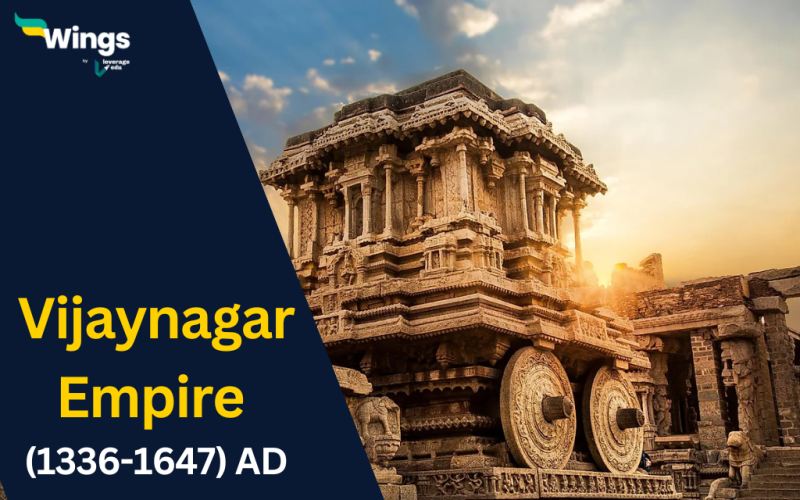The Vijayanagar Empire (1336–1647) AD: The founder of the Vijayanagar Empire were brothers Harihara and Bukka, who were soldiers in Muhammad-bin-Tughlaq’s army, founded the Vijayanagar kingdom in the year 1336. In 1336, they seceded from the Delhi Sultanate and established an independent state in Karnataka, with the capital city of Vijayanagar on the banks of the river Tungabhadra.
Vidyaranya, a contemporary scholar and saint, assisted and inspired Harihara and Bukka in establishing their kingdom.
Table of Contents [show]
About Vijayanagara Empire
The kingdom is named after the city of Vijayanagara (modern-day Hampi). The empire now encompassed the whole of south India, from the Krishna-Tungabhadra plains up to Rameshwaram.
Also Read – Pallava Dynasty: Origin, Achievements, and Legacy
Political History of the Vijaynagar Empire
Vijayanagar was ruled by four different dynasties
- Sangama dynasty (1336-1486)
- Saluva dynasty (1486-1506)
- Tuluva dynasty (1506-1565)
- Aravidu dynasty (1570-1647)
Also Read – Chalukya Dynasty: Founder, Legacy and Decline
Administration of Vijaynagar Empire
- They adhered to conventional monarchy.
- In a kingdom, the king was the supreme ruler. Additionally, he served as the army’s top commander.
- A council of ministers assisted the king in carrying out daily duties.
- The amaranayaka was one of the key aspects of the Vijayanagar government. This is similar to the iqta system of the Delhi Sultanate.
- The Vijayanagar army’s commander was referred to as the nayaka. An area was assigned to each nayaka for administration. The Nayaka was in charge of increasing agricultural production in his region.
- He maintained his army, horses, elephants, and weapons of war by collecting taxes in his region and using the money to supply the Vijayanagar raya or ruler.
- In order to show their loyalty, the amara-nayakas sent the king tribute on a yearly basis and personally appeared in the royal court bearing gifts.
Society of the Vijaynagar Empire
- People lived a luxurious life.
- Dresses were mostly made of silk and cotton. People wore perfumes, flowers, and ornaments. Paes mentions the wealthy’s beautiful homes and a large number of household servants.
- Prostitution had become institutionalized.
- The devadasi, or temple dancer system, grew in popularity.
- Sati practice was strengthened further.
- Existence of the four caste groups known as Brahmins, Kshatriyas, Vaisyas, and Sudras.
Also Read – Lodi Dynasty- Exploring India’s Medieval History
- It is believed that the rulers of this kingdom praised Vishnu. However, they were renowned for their religious tolerance as well.
- Women of this kingdom held prominent positions and were highly active in the overall social and political life. Moreover, some of them were also learned.
- People from the Muslim community were given job opportunities in administration.
- Dresses worn during their reign were made mostly from silk or cotton material.
Architecture of the Vijaynagar Empire
This section contains all the important points you need to mention while answering the Architecture of Vijay Nagar Empire UPSC questions.
- They used the Dravidian style of architecture and added some unique features, giving it the name Vijayanagara style.
- Local hard granite was the preferred building material, as it had been for the Badami Chalukyas.
- Vijayanagar temples are characterised by ornate pillared Kalyana mandapa (marriage halls); tall rayagopurams (carved monumental towers at the temple’s entrance) built of wood, brick, and stucco in the Chola style; and adorned with life-sized figures of gods and goddesses.
- Vijayanagar’s courtly architecture is typically made of mortar mixed with stone rubble and features secular styles with Islamic-influenced arches, domes, and vaults.
- Famous Vijayanagar temples include the Virupaksha Temple in Hampi and the Hazara Rama temple of Deva Raya I, among others.
Vijaynagar Empire Map
FAQs
The Vijaynagar Empire is famous for its architecture, the ruins of which can be found in modern-day Hampi. Some people also know this empire because of the famous Tales of Tenali Rama, who was a courtier in Krishnadeva Raya’s Court.
It was founded by Harihara, also known as Hakka, and his brother, Bukka Raya. It is named after its capital city (now ruined), Vijayanagara, in modern Karnataka, India.
Krishnadeva Raya was the most famous king of the Vijaynagar Empire. During his reign, the Vijayanagar kingdom reached its pinnacle of glory. He was victorious in every war he fought. He defeated the king of Odisha and annexed Vijaywada and Rajmahendri.
Relevant Blogs
| Pala Dynasty | Lord Irwin |
| Sayyid Dynasty | Shisunga Dynasty |
| The Government of India Act 1919 | Civil Disobedience Movement |
| Morley-Minto Reforms | Gandhi Irwin Pact (1931) |
| Bengal Partition | Chera Dynasty |
That’s all about the Vijaynagar Empire! If you want to know more about topics like this, then visit our general knowledge page! Alternatively, you can also read our blog on general knowledge for competitive exams!
 One app for all your study abroad needs
One app for all your study abroad needs















 45,000+ students trusted us with their dreams. Take the first step today!
45,000+ students trusted us with their dreams. Take the first step today!
